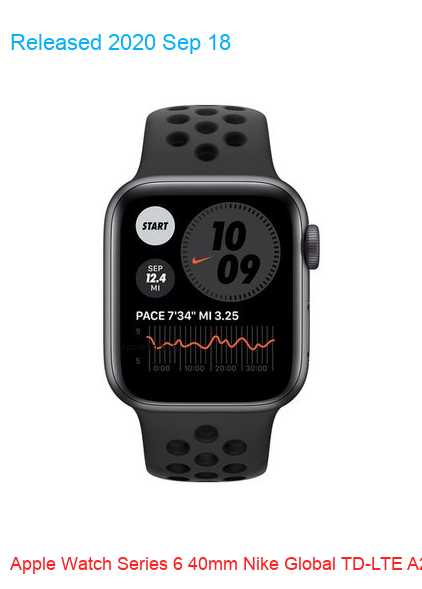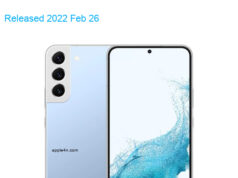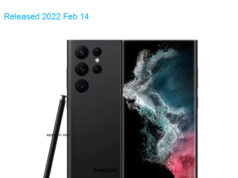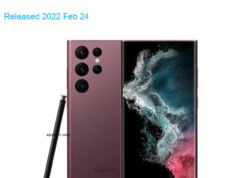| Brand | Apple |
| Model | Watch Series 6 40mm Nike Global TD-LTE A2375 |
| Released | 2020 Sep 18 |
| Announced | 2020 Sep |
| Hardware Designer | Apple |
| Codename | Apple Watch 6,3 |
| OEM ID | N158sAP |
| General Extras | Haptic touch feedback , Tactile touch feedback |
| Device Category | Smartwatch |
| Width | 34 mm |
| Height | 40 mm |
| Depth | 10.7 mm |
| Dimensions | 1.34×1.57×0.42 inches |
| Mass | 30.5 g |
| Platform | iOS / iPadOS |
| Operating System | Apple watchOS 7 |
| Software Extras | Voice Command , Intelligent personal assistant |
| CPU Clock | 1800 MHz |
| CPU | Apple S6 (T8301), 2020, 64 bit, dual-core, 7 nm, Apple S6 GPU |
| RAM Type | LPDDR4x SDRAM |
| RAM Capacity (converted) | 1 GiB RAM |
| Non-volatile Memory Interface | Yes |
| Non-volatile Memory Capacity (converted) | 32 GB ROM |
| Display Diagonal | 39.9 mm |
| Resolution | 324×394 |
| Horizontal Full Bezel Width | 8.66 mm |
| Display Area Utilization | 57.4% |
| Pixel Density | 325 PPI |
| Display Type | AM-OLED display |
| Number of Display Scales | 16.8M |
| Display Refresh Rate | 60 Hz |
| Scratch Resistant Screen | Yes |
| Graphical Controller | N/A |
| A/V Out | No |
| Microphone(s) | mono |
| Loudspeaker(s): | mono |
| Audio Output: | No |
| Supported Cellular Bands | UMTS2100 (B1) , UMTS1900 (B2) , UMTS1700/2100 (B4) , UMTS850 (B5) , UMTS900 (B8) , LTE2100 (B1) , LTE1900 (B2) , LTE1800 (B3) , LTE1700/2100 (B4) , LTE850 (B5) , LTE2600 (B7) , LTE900 (B8) , LTE800 (B18) , LTE800 (B19) , LTE800 (B20) , LTE1900 (B25) , LTE850 (B26) , LTE700 (B28) , TD-LTE1900 (B39) , TD-LTE2300 (B40) , TD-LTE2500 (B41) , LTE1700/2100 (B66) bands |
| Supported Cellular Data Links | UMTS , HSUPA , HSUPA 5.8 , HSDPA , HSPA+ 21.1 , DC-HSDPA 42.2 , LTE , LTE 100/50 , LTE 150/50 data links |
| SIM Card Slot | e-SIM |
| Complementary Phone Services | Voice transmission , Voice speaker , Vibrate |
| SAR (head) | 0.820 W/kg |
| 2nd highest SAR (head) | 0.290 W/kg |
| Sec. Supported Cellular Networks: | No |
| Touchscreen Type | Capacitive multi-touch screen |
| Scroll Wheel | 3-way rotary scroll wheel |
| Expansion Interfaces | No |
| USB | No |
| USB Connector | No |
| Bluetooth | Bluetooth 5.0 |
| Wireless LAN | 802.11b , 802.11g , 802.11n |
| NFC | Yes |
| FM Radio Receiver | No |
| Complementary Satellite Services | A-GPS , QZSS |
| Supported GLONASS protocol(s) | L1OF |
| Supported Galileo service(s) | E1 |
| Camera Image Sensor | No |
| Focus | No |
| Flash | No |
| Aux. Camera Image Sensor | No |
| Aux. 2 Camera Image Sensor | No |
| Aux. 3 Camera Image Sensor | No |
| Aux. 4 Camera Image Sensor | No |
| Secondary Camera Sensor | No |
| Sec. Aux. Cam. Image Sensor | No |
| Built-in compass | Yes |
| Built-in accelerometer | Yes |
| Built-in gyroscope | Yes |
| Additional sensors | Altimeter , Barometer , HR sensor , SpO2 sensor , L sensor , Step counter |
| Protection from solid materials | Yes |
| Protection from liquids | 7 Protected against immersion up to 1m of depth |
| Immersion into liquids (depth limit) | 5000 cm |
| Battery | Li-ion |
| Nominal Battery Voltage | 3.85 Volts |
| Nominal Battery Capacity | 266 mAh battery |
| Nominal Battery Energy | 1.02 Wh |
| Estimated Battery Life | 18.0 hours |
| Talk Time: | 1.5 hours |
| Wireless Charging | Yes |
| Market Countries | Armenia , Australia , Azerbaijan , Austria , Belarus , Belgium , Bulgaria , China , Cyprus , Croatia , Czech , Denmark , Estonia , Finland , France , Germany , Greece , HK , Hungary , India , Indonesia , Ireland , Israel , Italy , Japan , Jordan , Kuwait , Latvia , Lebanon , Lithuania , Malaysia , Mongolia , Netherlands , Norway , NZ , Philippines , Poland , Portugal , Puerto Rico , Romania , Russia , Saudi Arabia , Serbia , Slovakia , Singapore , Slovenia , South Korea , Spain , Switzerland , Sweden , Taiwan , Thailand , Turkey , UAE , UK , Ukraine , Vietnam |
| Market Regions | Asia , Australia , Eastern Europe , Europe , Middle East , Oceania , Southeast Asia , Western Europe |
| Added | 2025-02-28 |
Specifications data description of this 📱Apple Watch Series 6 40mm Nike Global TD-LTE A2375📱
Title: Apple Watch Series 6 40mm Nike Global TD-LTE A2375: Specifications & Overview
Introduction:
Hello readers! Today, we’re excited to bring you an in-depth look at the Apple Watch Series 6 40mm Nike Global TD-LTE A2375. As one of the latest offerings from Apple, this smartwatch packs a punch with its advanced features and sleek design. Let’s dive into the details.
Lineup:
The Apple Watch Series 6 is the latest addition to Apple’s smartwatch lineup, offering a variety of models and features. The Nike Global TD-LTE A2375 is a special edition model, featuring exclusive Nike watch faces, a sport band, and built-in cellular connectivity.
Design:
The Apple Watch Series 6 40mm Nike Global TD-LTE A2375 boasts a stunning design, with a 40mm aluminum case and a durable, breathable Nike sport band. The watch is available in several colors, including silver, space gray, and gold. The always-on Retina display is bright and clear, with a resolution of 324 x 394 pixels. The device is water-resistant up to 50 meters and features a ceramic and sapphire crystal back.
Specifications:
🌐 NETWORK: The Apple Watch Series 6 40mm Nike Global TD-LTE A2375 features built-in GPS and cellular connectivity, allowing you to stay connected even when away from your phone. The device supports UMTS/HSPA/HSPA+/DC-HSDPA (850, 900, 1700/2100, 1900, 2100 MHz), GSM/EDGE (850, 900, 1800, 1900 MHz), CDMA EV-DO Rev. A (800, 1900 MHz), and LTE (Bands 1, 2, 3, 4, 5, 7, 8, 12, 13, 14, 17, 18, 19, 20, 25, 26, 28, 29, 30, 34, 38, 39, 40, 41, 66) networks.
📅 LAUNCH: The Apple Watch Series 6 was launched in September 2020.
🏋️ BODY: The Apple Watch Series 6 40mm Nike Global TD-LTE A2375 weighs 30.5 grams and features a 40mm case size. The device is water-resistant up to 50 meters and features a heart rate sensor, accelerometer, gyroscope, and barometric altimeter.
🌈 DISPLAY: The Apple Watch Series 6 features an always-on Retina display with a resolution of 324 x 394 pixels. The display is bright and clear, offering a peak brightness of 1000 nits.
🤖 OS: The Apple Watch Series 6 40mm Nike Global TD-LTE A2375 runs watchOS 7, offering advanced features such as handwashing detection, sleep tracking, and new workout types.
🛠️ Chipset: The Apple Watch Series 6 features the S6 SiP chip, offering 20% faster performance than the previous generation.
💪 CPU: The Apple Watch Series 6 features a dual-core 64-bit processor, offering fast and efficient performance.
🖥️ GPU: The Apple Watch Series 6 features a GPU that is up to 2x faster than the previous generation, offering smooth graphics and animations.
🧠 MEMORY: The Apple Watch Series 6 features 32GB of storage, allowing you to store all your favorite music, photos, and apps.
📷 CAMERA: The Apple Watch Series 6 does not feature a camera.
🔈 SOUND: The Apple Watch Series 6 features a built-in speaker and microphone, allowing you to make calls, send messages, and use Siri.
📡 COMMS: The Apple Watch Series 6 features built-in GPS, cellular connectivity, and support for Bluetooth 5.0 and Wi-Fi.
💡 FEATURES: The Apple Watch Series 6 40mm Nike Global TD-LTE A2375 features exclusive Nike watch faces, a sport band, and advanced fitness features such as blood oxygen monitoring, elevation tracking, and sleep tracking. The device also includes fall detection and emergency SOS features.
🔋 BATTERY🔌 : The Apple Watch Series 6 features an 18-hour battery life, offering all-day use. The device charges quickly, with a magnetic charging cable.
Conclusion:
The Apple Watch Series 6 40mm Nike Global TD-LTE A2375 is an advanced and stylish smartwatch that delivers on both design and functionality. With its sleek design, advanced features, and exclusive Nike branding, this device is a must-have for any fitness enthusiast or tech lover. We invite you to leave a comment and let us know what you think of the Apple Watch Series 6 40mm Nike Global TD-LTE A2375!
This is the end of the generated text by mixAlfred. If you have any questions, feel free to ask.








